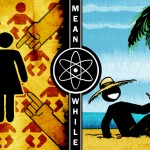Each Friday in Not Fit for Dinner, C. Ryan Knight explores political issues and the preconceptions guiding our understanding of and responses to them.
Tension between Iran and the United States has heightened with the revelation that the United States, along with Israel, launched the Stuxnet cybersabotage directed against Iran’s nuclear program back in 2010. This comes as no surprise to Iran, which suspected this all along.
Wall Street Journal writer Siobhan Gorman spoke with a former U.S. official connected to the Stuxnet attack who claimed the cybersabotage was “part of a larger campaign” and a “preferable alternative to airstrikes.” After quoting this former official, Gorman moved on to illuminate the groups connected with developing the technology for the attack: the CIA, the National Security Agency, the Idaho National Laboratory (run by the Department of Energy), and the Department of Homeland Security.
I find it strange that Gorman did not discuss the Department of Defense. Writing with Julian Barnes last year, Gorman reported on a decision from the Pentagon that cyber-attacks against America could be classified as acts of war. This announcement came ahead of a Pentagon report, expected to appear the following month, explaining its decision about cyber-attacks being acts of war.
The document, titled “Department of Defense Cyberspace Policy Report,” wasn’t published until November of last year, but it explained what Gorman said it would. Drawing from the United Nations Charter on what constitutes an act of war, the report argued that “some activities conducted in cyberspace could constitute a use of force, and may as well invoke a state’s inherent right to lawful self-defense.” The words “some” and “may” make the statement vague and open to interpretation, but it’s clear enough that cyber attacks are classifiable as acts of war.
Earlier in the report, it explains that the United States is working with its allies to improve its cyber-defenses in order to defend the “strategic calculus.” Furthermore, it states that attacks meant to cripple America’s cyber-infrastructure would be taking a “grave risk,” bound to be responded to by the Commander in Chief with “all means necessary.”
So, then, what Gorman did not note, but dearly needs noting, is that the United States, by its own official position, carried out an act of war against Iran.
Iran can easily make the case that their nuclear energy is a crucial component of its national economy (especially with the severe sanctions imposed upon it the world over). According to the Cyberspace Policy Report, economy, along with military and government, are the three key areas that merit national response if cyber-attacked. After all, a United States military official warned potential cyber-aggressors to expect an even more violent response: “If you shut down our [America’s] power grid, maybe we will put a missile down one of your smokestacks.” It’s doubtful Iran will respond immediately according to this idea, but based on the military official’s perspective, they certainly reserve the right to do so—“with all means necessary”—at this point.
Let us recall the words of Christ regarding hypocrisy, double-standards, and the likes: “Why do you look at the speck that is in your brother’s eye, but do not notice the log that is in your own eye?” (Matthew 7.3) Considering the Department of Defense document came out over a year after America’s cyber-attack of Iran, it’s quite apparent that America forgives (or overlooks) its own acts of war in the name of national defense, security, and the preservation of its interests. America would no doubt leap, however, to quickly respond to cyber-attacks by others against it as acts of war. It should thus be no surprise that America is accused of hypocrisy and hegemonic imperialism.
I agree that Iran having nuclear weapons is by no means ideal. Yet we must wonder if Iran can be blamed for potentially pursuing nuclear weapons as a deterrent when it lives with the daily threat of military action against it by Israel and now the knowledge that future cyber-attacks, even more aggressive than 2010’s Stuxnet, could be imminent. Iran, too, has national interests and concerns about national defense, even if those interests aren’t America’s.
See also: Not Fit for Dinner: The Faith Policy of Rick Santorum











